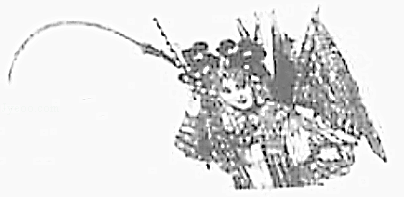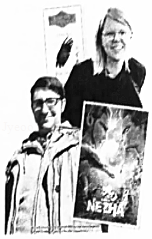Droughts (干旱)are common in Kenya . Before ,they came every 10 years ,but now they seem to be hitting us more often and for a longer time .
We gave the droughts names :“longoza”was the drought when many animals died ; there was the drought of the “planes” because food was dropped from the air by planes; and one particularly bad drought was called “ man who dies with his money in his fist (拳头)”,because ,even if there was money , there was simply no food to buy .
I was born in 1951 in Machakos. From what my mother tells me , when I was 7, there was a serious drought . I clearly remember the terrible weather and the hunger. I can’t tell you how many times I went to bed without eating . “ I slept like that ,” is how we described it . I can’t count the number of days when “ I slept like that,” or describe the feeling of going to sleep hungry ,knowing I’d wake up and there would still be no food for breakfast.
My father would leave early in the morning carrying a little basket to ask for food on credit (赊欠). Each night he would return home around 10:00p.m. My mother would try to encourage me by telling me to keep the water in our pot boiling so that when my father arrived we could quickly cook any food he brought in the already prepared water . I would keep the fire burning and the water boiling , along with the hopes that we would eat that night. But my father would arrive frustrated and empty -handed. And I would sleep like that.The best title for the text is ________.
| A.A Hungry Childhood Caused by Droughts |
| B.Food and Hunger |
| C.Protecting the Environment |
| D.Droughts and Their Names |
What does the drought of the “ longoza”refer to (指代)?
| A.Many animals needed food dropped by planes. |
| B.People had to eat animals because of hunger. |
| C.Many animals died because of the droughts. |
| D.People died of hunger even if they had money. |
Why would the author keep the fire burning and the water boiling?
| A.To wait for her father to come back to have supper. |
| B.To cook the food that her father would bring back. |
| C.To keep her house warm all night. |
| D.To make her hungry mother happy. |
The sentence “I slept like that ” means “ ________.”
| A.I was disappointed when my father came back empty-handed |
| B.I felt sorry because my family got hungry again |
| C.I went to sleep with no food for breakfast. |
| D.I went to bed with nothing to eat |
Lively music, singing and the sound of beating drums fill the room.As an orchestra(管弦乐队) plays performers dressed in colorful costumes move across the stage(舞台). Welcome to Chinese opera.
Chinese opera is an important(元素)of Chinese culture. Most operas are based on stories from long ago. The amazing stage performances are often set against grand backgrounds. Beautiful paintings hand movements and martial arts(武术)help tell these famous stories.
There are more than 300 forms of Chinese opera, including Beijing Opera, Yue Opera, Yu Opera, Ge Zai Xi and many other forms. of all of them, Beijing Opera is the most famous. Beijing Opera combines(合并)singing, dancing and acrobatics. Instruments such as drums, bells and cymbals accompany(伴奏)the performances.

Facial design
Traditionally, performers used masks(面具) for their facial design. Today, however, performers use makeup, They paint colorful designs on their faces. These colors and designs help to create each character. For example, a brave character has a red face, while a black face means bold. A yellow and white face represents (代表) someone who is dishonest.
Costumes

Costumes give clues(线索)to the performers' characters and roles.Audiences(观众)that are familiar with opera will get to know a story by the masks and costumes. Costumes usually have many designs and colors. The same costume can be used in different shows, however, it will represent a different character.
Promoting the arts
Many colleges and schools in China desire(渴望)to keep the art of Chinese opera alive. They provide an education system for talented students. Applicants(应试者)must pass a written test,an audition(试镜)and an interview and only the most promising students are accepted to study at these colleges and schools. Once accepted into the program, students begin a seven﹣to﹣twelve﹣year journey through the school. After graduation, many go on to work as professional actors on stage or in the movies.
(1)Of all forms of Chinese opera, which is the most famous?
A.Beijing Opera
B. Ge Zai Xi
C. Yu Opera
(2)The character with a yellow and white face is .
A. brave
B. dishonest
C. bold
(3)What does the word promising mean in the passage?
A.诚信的
B.热情的
C.有前途的
(4)Which of the statements is NOT TRUE according to the passage?
A. Anyone who likes Chinese opera can be accepted into the program.
B. If a person knows opera well, masks and costumes will help know the story.
C. Once in the program, you have to study for 7 to 12 years at school.
(5)What is the passage mainly talking about?
A. Chinese culture
B. Beijing Opera
C. Costumes and facial design
[1] It's Friday evening.My daughters sighed(叹息) when I gently took the iPads away from their laps.One by one, our screens we returned off.We lit the candles and sat down to have a big meal.
[2] We call it our "Technology Shabbat"(科技安息日) which lasts from sunset(日落)on Friday to sunset on Saturday.Now most friends know they will not be able to contact(联系) us by using computers or mobile phones for 24 hours.
[3] I first understood the importance of "Technology Shabbat" in 2008, when my father had got brain cancer.Some day he would have only one good hour, and the only thing I wanted to do was to be with him.When I looked ①______my father, I turned off my mobile phone.
[4] Soon after that,my husband and I decided to turn off all the electronic things for one full day every week.
[5] During our "Technology Shabbat",times lows down.Our Saturday snow feel like mini﹣vacations.We drive cars or ride bikes.We work in the garden, play board games and cook meals with our kids.I feel like a better mother, wife and person.
[6] Keeping a balance(平衡) between the good and the ②______of technology is important for my family.The technology helps us share knowledge and funny ideas all over the world.But the technology also takes something away from us.When we ③_____up late at night linking(连接) from website to website or sending messages, we click(点击) again and again until we have been overloaded(超负荷的).
[7] Now we're rushing into the time full of high technology.(5)We should pay attention to what we are doing online and when we should go offline.
[8] I will always remember the most important thing in my family:Technology Shabbat.
(1)When is "Technology Shabbat" in the writer's family?(No more than 10 words)
(2)What did the writer and her husband decide to do after her father got cancer?(No more than 18 words)
(3)What's the good of technology according to the passage?(No more than 15 words)
(4)Fill in each blank with one proper word.
①
②
③
(5)Translate the underlined sentence in the seventh paragraph into Chinese.
.
(6)Do you like the idea of "Technology Shabbat"?Why or why not ?(No more than 25 words)
In recent years, a growing number of Chinese books and movies have been translated into other languages,(1) They have been learning Chinese and are interested in Chinese culture.Anna is one of them.Before she translated JinYong's novel Legends of the Condor Heroes(《射雕英雄传》),the writer was little known to English readers.(2)
But Anna managed to do it.Impressed(使……印象深刻)by the book's themes(主题) of good against evil,loyalty(忠诚)and love,as well as Chinese philsophy(哲学) ,Anna hoped to bring it to new readers.After five years of work, the translated book was published in 2018.(3) Many people think Anna did a good job.
Anna studied at the University of Oxford.(4) After the trip she became interested in China and began to learn Chinese.She calls herself "a clumsy(笨拙的) student, just like Guo Jing from Legends of the Condor Heroes, but one of loyal heart".
(5) Last year, he translated the animated movie Ne Zha.He said."I see China's stronger cultural influences.And we have a growing number of students majoring in Chinese.More Chinese stories will appear in front of new audiences."
|
A.Like Anna, another translator David also learned Chinese in college. B.She took a trip to China at the age of 21. C.Many of the translators are young people. D.One reason for this was that his works were too hard to translate. E.It was reprinted(再版) seven times within several months in the UK. |

To many people,art is a human expression of creativity.But in recent years,you may have read news about artificial intelligence(AI) creating its own art,such as painting or writing poems.Some people worry that AI might someday replace(替代) artists.
But this worry seems to be unnecessary,at least for now.Many artists today are turning AI into a useful tool. Instead of replacing artists,AI is bringing artists more possibilities.
A piece of music created by Al recently attracted attention.AI was used to create the music based on the protein(蛋白质) structure of COVID﹣19.The music lasted nearly two hours.The project was led by Markus Buehler, an American musician and MIT professor(教授) of engineering.He assigned(指定) a unique note(独特的音符) to each amino acid(氨基酸)in the protein.The AI then translated these notes into music.
Listeners found the project "mind﹣blowing"."It allows me to see the virus in a new way,"said one listener.This surprising combination(结合) between science and art could not be achived without AI.As The Verge wrote,"AI helps artists play around in unpredictable ways,creating things beyond(超过)what they have ever thought was possible before."
Apart from creating imaginative works,AI can also take care of repetitive(重复乏味的)tasks for artists.For example,in the comic and cartoon industries,there are now AI tools that can automatically(自动)color in back﹣and﹣white line drawings.Although the results can be unpredictable and require a little cleanup,it can give artists room to experiment(实验),by cutting down the time it takes to color each picture.
As Peter Ward wrote for The Culture Trip,"Art of every kind has always been influenced by technological developments."AI can become a useful tool to bring change to the art world if it's welecomed and not unfairly feared.
(1)According to the passage, AI can't now.
A.write poems
B.paint
C.replace artists
D.create music
(2)Which of the following is NOT true according to the third and fourth paragraphs?
A.AI created a piece of music about COVID﹣19.
B.Many of AI's art creations are beyond artists' imagination.
C.Science and art can be combined with the help of AI.
D.Markus Buehler was not a professor of engineering,but a musician.
(3)The underlined phrase "Apart from" in the fifth paragraph can be replaced by" ".
A.Besides
B.Instead of
C.Because of
D.According to
(4)What's the main idea of the passage?
A.Technological developments have greatly influenced people's daily life.
B.AI has been widely used in science research.
C.AI is bringing more help to the art world as a useful tool
D.AI's creativity has caused more and more worries.

If you walk along the River Thames, there are lots of interesting buildings to see.Running through the heart of London,there are also many galleries, markets, shops and keep you busy along its banks. You will also see a strange round building.It looks very old and very different from all the others.This is Shakespeare's Globe Theatre(莎士比亚环球剧场).
The Globe Theatre was first built here in 1599.William Shakespeare was one of the most famous writers that ever lived.His plays were performed in the theatre for many years.However,in 1613, a fire broke out during a performance.The theatre was destroyed(毁坏),but the second was built the following year.It remained a theatre until 1644,and then it was pulled down to build houses.The modern(and also the third) Globe Theatre was completed in 1997, over 350 years later.This was done to honor Shakespeare,the most famous English writer.To this day, his many plays are performed there daily.He wrote around thirty﹣eight plays.They are comedies(funny stories) ,histories(about historical events and people) , and tragedies(serious and sad stories).People come from all over the world to watch them at the Globe Theatre.They are performed in exactly the same way as they were hundreds of years ago.
The building is round and made mostly of wood.There are simple seats on three different levels all around the sides.Everyone can see the stage(舞台).However.there is no roof(屋顶) in the middle! The cheapest tickets are standing tickets. You stand in the middle,right in front of the actors,but if it trains,you will get wet!
(1)When was the second Globe Theatre built?
A.In 1599.
B.In 1613.
C.In 1614.
D.In 1997.
(2)What can we know about Shakespeare according to the second paragraph?
A.Shakespeare was one of the most famous French writers.
B.Many of his plays are performed daily in the modern Globe Theatre.
C.His plays are performed in a different way from they were hundreds of years ago.
D.He wrote thirty﹣eight plays that were all about historical events and people.
(3)What does the last paragraph mainly tell us?
A.The inside structure(结构) of Shakespeare's Globe Theatre.
B.The history of Shakespeare's Globe Theatre.
C.The opening time of Shakespeare's Globe Theatre.
D.The three types of tickets that you can choose.
(4)Which of the following statements about the modern Globe Theatre is TRUE?
A.It has remained there for over 350 years.
B.The round building looks old and strange.
C.It is made mostly of wood and has around roof in the middle.
D.If we buy the cheapest tickets in the theatre, we will be farthest from the stage.
